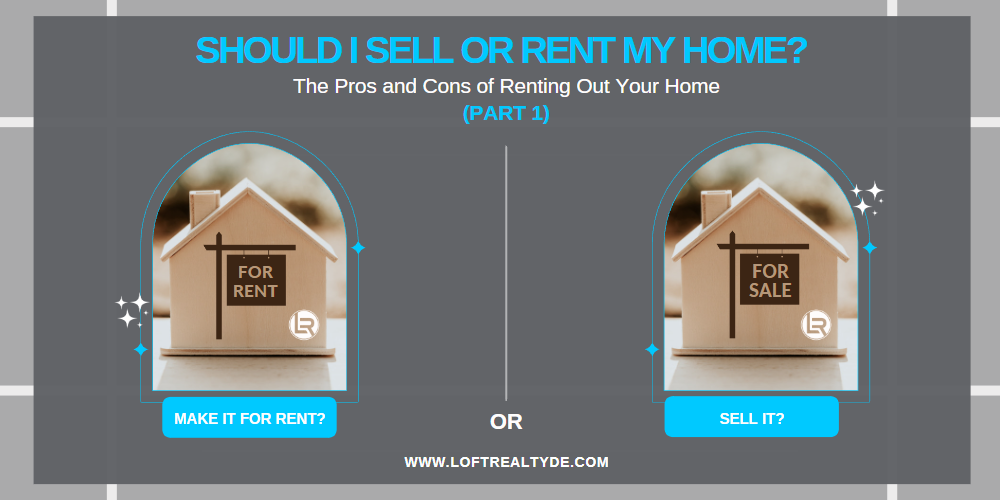Should I Sell or Rent my Home? The Pros and Cons of Renting Out Your Home

The coronavirus pandemic led to record-low lending rates, few supplies, and prices that went through the roof. During the lockdowns and social isolation, many Americans wondered if they would be better off in a new house or region like Delaware.
Should you sell your house or rent it out? Both have pros and cons, and your choice depends on the property, the finances, and the person.
Let's look at how to decide if you should sell or rent out your property.
The Pros of Renting Out Your Home
There are many good reasons to rent out your property. You might want to rent your house instead of selling it.
1. Renting provides you with extra cash flow and income.
One of the best reasons people don’t sell is the opportunity for continuous extra income. If you're considering renting your property, find out how much it would cost. This can be done with online tools.
The value of your home as a rental depends on where it is and what it is. Determine how much money you need each year to do the work and whether the risks are worth it.
Some landlords work all day, every day. With enough rental properties that bring in money, rent could be like a wage. When you have more rental properties, you have more responsibility, time, energy, and renters to screen.
2. Renting gives you more home equity.
You'll have more equity when you sell your home. When renters pay the mortgage, they are building equity. If the rent is more than the cost of financing and other expenses, the rent pays the mortgage.
The principal loan amount goes down every month that the property is rented. People like to rent their homes because they can build equity without paying the mortgage or interest.
3. Renting allows you to ride out a bad market.
If you think your home will increase in value over time but don't think now is the best time to sell, renting lets you wait until the market improves. This means you can pay your mortgage and make a little money until the market improves.
4. Renting makes you use low-cost leverage techniques.
Three ways renting out your home could help you. The most important things are income, equity, and low-cost leverage.
Loans for real estate are cheaper than loans for other types of assets. Most of the time, mortgage interest rates have been low. When capital costs go down, equity returns go up. When you rent your property, someone else pays for the low-cost leverage, and principal amortization helps you.
5. Renting allows you to keep your options open.
Another good thing about renting is that it might give you more options than selling. If you keep the house as a rental, you can return if you change your mind.
Some people rent out their homes for a short time. This gives some people more options for how to use their house. With short-term rentals, you can stay in your house during the school year and travel during the summer.
Not every home is suitable for short-term renters. Short-term rentals, like Airbnb, could also be a problem. Even though short-term renters have some advantages over long-term renters, this is not a less dangerous way to rent.
Whether or not your home is worth renting out for a short time will depend on where it is. Think about whether the local market is a tourist area, a college town, a big city, or another place that gets a lot of short-term visitors.
The Cons of Renting Out Your Home
Not everything goes smoothly when you rent out your home. Let's look at some fundamental problems with renting your home instead of selling it.
1. Being a landlord can be frustrating and take up a lot of time.
This is the worst thing about renting out your home. It might seem like passive income to rent out your house, but it can be a lot of work and pain.
As a landlord, you must set up showings, choose tenants, set up rent collection, answer the phone 24/7, and more. You can outsource all or part of this process to save time and money, but it won't put you at risk of not getting renters. It may or may not change how much money you have.
Landlords check on tenants, talk to them, collect rent, advertise vacancies, show the property, sign leases and collect deposits, and make sure repairs and maintenance are done. This could make or break your time as a landlord.
One rental property is not too much work and is worth it. But it will take a lot of work to add more rental properties to your portfolio. If you don’t want the hassle, you can hire a property manager, for whom you pay either a percentage of the rent or a set fee every month.
2. Vacancy hurts your monthly expenses.
Vacancies can quickly become a burden that costs money. Even if no one is living in the house, you still have to pay for maintenance and the mortgage, which may greatly cut your annual return on investment.
3. You’ll have continuous concerns over repairs and maintenance.
If you sell your home, you'll never have to cut the grass or fix that leaky faucet again. But you are still responsible for any problems that happen when you rent out your home.
Tenants can also cause property damage. Unexpected expenditures may surprise you. The heating and cooling system breaks down in the summer or winter, the roof needs to be fixed or replaced sooner than expected, the property floods because of a broken pipe, or the tenants leave the place in bad shape when they leave.
Set aside some of your monthly rent for costs you didn't expect. You'll need to work with tenants, repairmen, plumbers, or contractors to fix the problem.
4. It's risky to rent out your own home.
Being a landlord can be challenging, unpleasant, and even dangerous. On the Internet, you might find horror stories about bad tenants who made landlords lose all their money.
Evictions and late rent can hurt the income from a property. Evictions can be expensive and upsetting, and the tenant may have left your house dirty or in need of repairs.
A lousy tenant or rental situation could put a landlord out of business. There are ways to stop this, but being a landlord comes with many risks.
If you don't follow state landlord-tenant laws or your renter gets hurt on your property, you could get in trouble with the law.
Final Thoughts
You need to be honest about whether or not you want to be a landlord. Some landlords have simple businesses that do well, but many others find that being a landlord is hard work that isn't worth the trouble or risk. Some tenants will be a dream, but others will require a lot of patience and hard work.
If you are planning to sell your home instead of renting it out, read about the pros and cons of selling a home. And as always, we at Loft Realty will be glad to help. Feel free to contact us today, and let’s plan together!
Categories
Recent Posts

Top-Rated Hospitals in Delaware

Exciting Events to Heat Up Your Winter in Delaware!

Smarter Home-Buying Decisions

Why Retirees Are Falling in Love with Delaware: Neighborhoods, Communities, and Everything in Between

Best Places to Go Sledding in Delaware

Delaware’s Secret: Reasons Why It’s Not Expensive to Live Here!

5 Best Spots for Last-Minute Holiday Shopping

8 Best Places to Eat at the Rehoboth Beach Boardwalk

The 8 Biggest Mistakes People Make When Moving to Delaware—Here's What You Need to Know

Is Wilmington, Delaware Safe? A Look at Recent Changes in Crime Rates and Community Efforts
GET MORE INFORMATION

